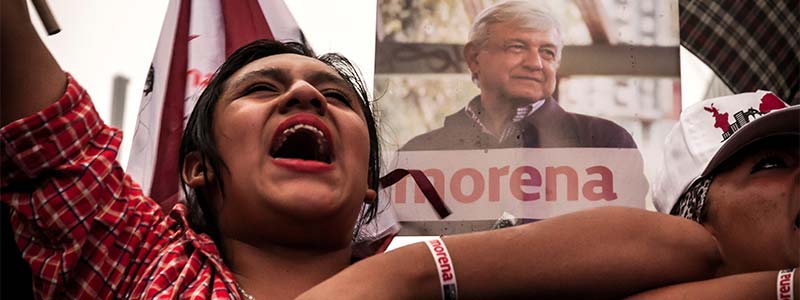Mexico: major challenges for president-elect include corruption, violence and poverty
Ruth Green, IBA Multimedia Journalist

Mexico is used to seismic activity, but not of the electoral kind. On 1 July the country witnessed its biggest political shake-up in decades as Andrés Manuel López Obrador claimed a landslide victory, vowing to tackle endemic corruption, poverty and violence.
López Obrador, often known by his initials AMLO, ran for presidency in 2006 and 2012, claiming fraud kept him from victory both times. The former Mexico City mayor promised to stamp out corruption during his latest campaign, which resulted in him winning 53 per cent of the vote.
Incumbent President Enrique Peña Nieto was not eligible to stand for a second term, but the electorate was already ready for change, says Michael Camilleri, Director of the Peter D Bell Rule of Law Program at Washington, DC-based think tank Inter-American Dialogue. ‘The big takeaway is something we’ve seen in other places, which is a citizen backlash against the establishment and traditional parties and a lot of that is driven by corruption and impunity,’ he says. ‘I think the big question now is “can he meet those expectations for providing a different kind of politics and a more effective form of governance?”’
Like many other Latin American countries, Mexico has been tainted by the Car Wash corruption investigation that swept from Brazil across the region. Peña Nieto has not been implicated in the scandal, but the impact on his Institutional Revolutionary Party (PRI) is significant: four PRI governors face corruption charges.
Corruption is a major issue and is bound up with Mexico’s spiralling violence and crime levels. The country’s National Public Security System (SNSP) listed a record 25,339 murders in 2017. Watchdog agency Semáforo Delictivo and Lantia Consultores estimates 75 per cent of these are linked to organised crime. The election itself was marred by violence as 130 candidates and political workers were killed since campaigning began in September.
If Mexico wants to increase its growth rates, we must address these problems head on as pillars of development
Carlos del Rio
Officer, IBA Latin American Regional Forum
Camilleri says recent incidents, such as the 2014 disappearance of 43 students from Ayotzinapa, have exposed the failure by successive governments and law enforcement agencies to investigate and punish the perpetrators of violent crime. ‘None of the recent governments have been able to implement an effective public security strategy,’ he says. ‘The violence is localised…but the overall picture is of weak and often corrupt local and state police; strong cartels that often fight these very bloody turf battles over trafficking routes, and a federal law enforcement system that has proven in some important cases, including Ayotzinapa, not to have been up to the job.’
The toll of Mexico’s violence on women is particularly perturbing. The SNSP reported 70 femicides – where women are killed by men on account of their gender – in April 2018 alone, emphasising the scale of the problem facing the president-elect. ‘Femicide was introduced into the Penal Code, but often law enforcement agencies themselves use violence against women,’ says Veronica Hinestroza, Senior Programme Lawyer at the IBA's Human Rights Institute. ‘There needs to be a cultural shift to end the impunity for femicides.’
Controversial initiatives introduced by previous governments, including creating pink, female-only buses, haven’t helped matters, she says: ‘It’s about moving away from “pink policies” and really examining the needs of and addressing the violence against women.’ Thanks to gender quotas, when the new Mexican Congress sits on 1 December, women will make up 49 per cent of the lower house and 51 per cent of the Senate. However, Hinestroza expresses concern over AMLO’s coalition with the evangelical Social Encounter Party (PES), which 'appears to be against the advancement of women’s rights'.

Corruption, impunity and violence are hampering economic development and the country’s GDP fell to 2 per cent in 2017. ‘If Mexico wants to increase its growth rates, we must address these problems head on as pillars of development,’ says Carlos del Rio, a partner at Creel Garcia-Cuellar Aiza y Enriquez and an officer of the IBA Latin American Regional Forum. ‘No government has been able to work hand in hand with private initiative and civil society organisations (CSOs) to address these major challenges. It would be extraordinary to see the López Obrador government working together with the judiciary and the legislative branch to coordinate efforts at the federal level with the states, the private sector and CSOs and define the necessary steps to address these significant challenges and find short, medium and long-term solutions.’
An estimated 70 per cent of Mexicans live below the poverty line. ‘Poverty is the most serious problem affecting the country and this, along with the lack of the rule of law, is the main cause of the violence,’ says José Visoso, a partner at Galicia Abogados and also an officer of the IBA Latin American Regional Forum. ‘The huge test for the next government will be to reduce extreme poverty and improve the security situation.’
Most experts agree that AMLO, who takes office in December, should adopt a cautious approach to economic reform. The oil and gas sector, which has been open to foreign investment since December 2013, is one area he has focused on to date, saying he will review all existing oil exploitation contracts offered to international companies to ensure they are free from corruption.
Questions remain over the future of the North American Free Trade Agreement (NAFTA) and trade and border relations with the US – Mexico’s largest trading partner. AMLO may have softened his earlier opposition to NAFTA, but Del Rio says the new administration ‘cannot neglect the challenges surrounding the renegotiations to achieve the continuity of NAFTA between the US, Canada and Mexico.’
